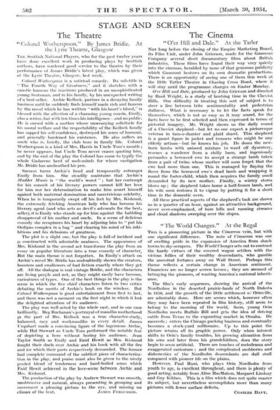STAGE AND SCREEN The Theatre
"Colonel Wotherspoon." By James Bridie. At the Lyric Theatre, Glasgow
TuE Scottish National Players, who for the past twelve years have done excellent work in producing plays by Scottish authors, have rendered good service to the theatre by their performance of James Bridie's latest play, which was given at the Lyric Theatre, Glasgow, last week.
Colonel Wotherspoon is a satirical comedy. Its sub-title is "'The Fourth Way of Greatness," and it sketches with a caustic humour the reactions produced in an unsophisticated young Scotsman, and in his family, by his unexpected writing of a best-seller. Archie Kellock, partner in a decaying family business until he suddenly fmds himself made rich and famous by the novel which he has written " with his heart's blood," is blessed with the affection of a charming young cousin, Emily, also a writer, but with ten times his intelligence—and no public. He is cursed with a mother whose unwearying solicitude for his moral welfare and the respectability of the Kellock family has sapped his self-confidence, destroyed his sense of humour, and generally burdened his existence. He also suffers an uncle who is, briefly, the club bore in family life. Colonel Wotherspoon is a kind of Mrs. Harris in Uncle Tom's mouth ; he never appears, but Uncle Tom never ceases quoting him, and by the end of the play the Colonel has come to typify the whole Gadarene herd of mob-minds for whose castigation Mr. Bridie has unsheathed his pen.
Success turns Archie's head and temporarily estranges Emily from him. She steadily maintains that Archie's Madder Music is " the world's worst " ; but her contempt for his conceit of his literary powers cannot kill her love for him nor her determination to make him assert himself against both maternal domination and meretricious celebrity. When he is .temporarily swept off his feet by Mrs. Kishmul, the extremely fetching American lady who has become his literary agent (and who acts as devil's advocate for the best seller), it is Emily who stands up for him against the babbling disapproval of his mother and uncle. In a scene of delicious comedy she recaptures his heart by adjuring him to put his Oedipus complex in a bag " and clearing his mind of his inhi- bitions and his delusions of greatness.
The plot is a slight one, but the play is full of incident and is constructed with admirable neatness. The appearance of Mrs. Kishmul in the second act transforms the play from an essay on popular literature into a true comedy of character, But the main theme is not forgotten. In Emily's attack on Archie's novel Mr. Bridie has undoubtedly shown the creators, boosters and swallowers of bad fiction exactly where they get off. All the dialogue is real vintage Bridie, and the characters are living people and not, as they might easily have become, caricatures of types. One of the best things in the play is the scene in which the five chief characters listen to two critics debating the merits of Archie's book on the wireless. But Colonel Wotherspoon is good entertainment from first to last, and there was not a moment on the first night in which it lost the delighted attention of its audience.
The play was well acted by the whole cast, and in one case brilliantly. Meg Buchanan's portrayal of maudlin motherhood in the part of Mrs. Kellock was a true character-study, balanced, racy and workmanlike in every detail. James Urquhart made a convincing figure of the ingenuous Archie, while Hal Stewart as Uncle Tom performed the notable feat of depicting a bore without boring his audience. Jean Taylor Smith as Emily and Enid Hewit as Mrs. Kishmul fought their duels over Archie and his book with all the fire and ice which their parts respectively demanded. The former had complete command of the subtlest piece of characteriza- tion in the play, and praise must also be given to the nicely graded blend of tenderness and hard-boiled sense which Enid Hewit achieved in the love-scene between Archie and Mrs. Kishmul.
The production of the play by Andrew Stewart was smooth, unobtrusive and natural, always presenting in grouping and movement a pleasing picture to the eye, and missing no








































 Previous page
Previous page